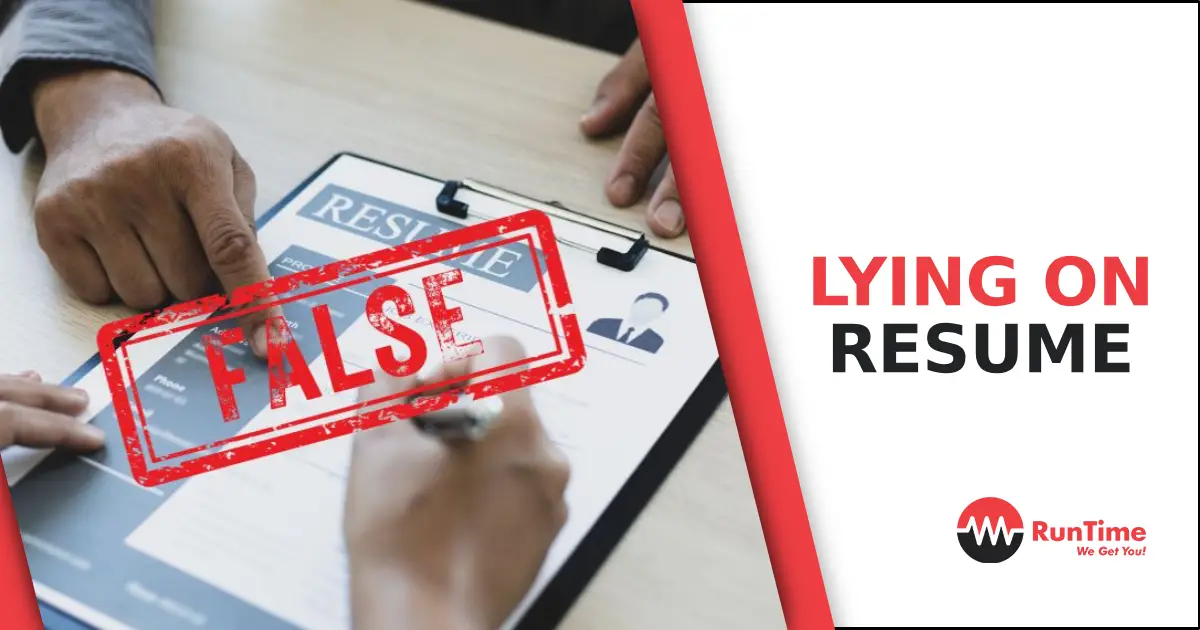Have you ever considered the idea of lying on your resume? If so, I strongly urge you to pause and read this article before taking any action.
It’s natural to want to stand out from the crowd and secure that dream position. But there’s a dangerous temptation that some candidates fall prey to lying on your resume. This article delves into the risks associated with falsifying your qualifications and provides valuable advice to ensure that you make the right choices in your job search.
What Happens if You Lie on Your Resume?
Falsifying your resume can lead to a cascade of problems once you secure the job. Here’s what can happen if you’re caught in the web of lies:
Termination
When your employer discovers the discrepancies between your resume and your actual qualifications, it can lead to immediate termination. Not only does this result in job loss, but it also stains your professional reputation, making it harder to find future employment.
Damage to Your Reputation
Word travels fast in the professional world. If you’re fired due to resume lies, the chances are that your reputation will be tarnished. Future employers may view you with skepticism, and colleagues might be wary of working with you.
Legal Consequences
As mentioned earlier, if your lies lead to financial losses for your employer or if you’re found guilty of fraud, you may face legal action. This could involve fines, civil lawsuits, or even criminal charges.
Industry Blacklisting
In some cases, your dishonesty might not just affect your current job but also impact your ability to work in your chosen industry. Engineering communities are often tight-knit, and your lies can quickly become known, leading to industry-wide distrust.
How Do Technical Recruiters Catch Resume Lies?
You might wonder how technical recruiters are able to detect lies on a resume. There are several ways they can uncover the truth:
Background Checks
Many employers conduct thorough background checks as part of their hiring process. These checks can verify your educational credentials, employment history, and certifications.
Reference Checks
Employers often contact your listed references to confirm your qualifications and work history. If your lies are uncovered at this stage, it’s nearly impossible to salvage your credibility.
Skills Assessment
In engineering positions, your skills and knowledge are crucial. Employers might ask technical questions or request a skills assessment to gauge your expertise. If you’ve lied about your abilities, you’ll be exposed during these assessments.
Online Presence
In the digital age, it’s easy for employers to research your online presence. If your LinkedIn profile, for example, contradicts what’s on your resume, it raises red flags.
Tips to Avoid Lying on Your Resume
Now that we’ve explored the risks and consequences, let’s discuss some important tips and advice to help you build a strong and truthful resume that will impress potential employers:
Be Honest
The most straightforward and effective advice is to be honest on your resume. Highlight your genuine qualifications and achievements. Honesty not only preserves your integrity but also ensures that you’ll be a good fit for the role you’re seeking.
Focus on Your Skills
Instead of inflating your qualifications, focus on your technical and soft skills, and experiences that make you a strong candidate. Highlight your achievements, projects you’ve worked on, and any relevant certifications or training you’ve completed.
Address Gaps Strategically
If you have employment gaps or periods of inactivity, address them honestly but strategically. Explain any personal or professional development you undertook during those times, such as further education or volunteer work.
Tailor Your Resume
Customize your resume for each job application. Highlight the skills and experiences that align with the specific job requirements. This not only increases your chances of landing the job but also reduces the temptation to embellish your qualifications.
Seek Professional Advice
If you’re unsure about how to present your qualifications on your resume, consider seeking professional advice. A career counselor or resume writer can help you craft a compelling resume that accurately represents your abilities.
Build a Strong Online Presence
Your online presence, especially on platforms like LinkedIn, should align with the information on your resume. Consistency is key, so make sure your profiles reflect your true qualifications.
Prepare for Interviews
If you’ve been honest on your resume, you’ll have no trouble discussing your qualifications during interviews. Be prepared to showcase your skills and experiences in a compelling way.
FAQs
Is a resume a legal document?
A resume is not a legal document; it’s a marketing tool for job seekers. However, providing false information on a resume could lead to legal consequences for fraud.
Is it illegal to lie on your resume?
Lying on your resume can have legal consequences, especially if it involves fraudulent claims or misrepresentation of qualifications. Legal actions can vary depending on jurisdiction and the severity of the lie.
What is considered lying on a resume?
Lying on a resume includes any false or misleading information presented to make yourself appear more qualified than you actually are. This can include fabricating job titles, inflating educational achievements, falsifying work experience, or providing inaccurate references.
Bottom Line
While the temptation to lie on your resume may be strong, the risks and consequences are not worth the potential rewards. Falsifying your qualifications can lead to job loss, damage to your reputation, and even legal trouble. Instead, focus on building a strong and truthful resume that highlights your genuine skills and experiences.
Engineering job seekers, in particular, should recognize that the industry values honesty and technical competence. By following the tips provided in this article, you can increase your chances of landing your desired engineering position without resorting to lies on your resume. Remember, in the long run, honesty is not only the best policy but also the most sustainable one for your career.
Make Your Dream Job a Reality with RunTime Recruitment
Our expert team of engineers-turned-recruiters offers in-depth knowledge of technical recruiting in the engineering industry and is dedicated to providing you with invaluable guidance and support throughout your job search journey.
If you’re a highly skilled engineer seeking new opportunities, explore job vacancies on RunTime Recruitment’s job site.









